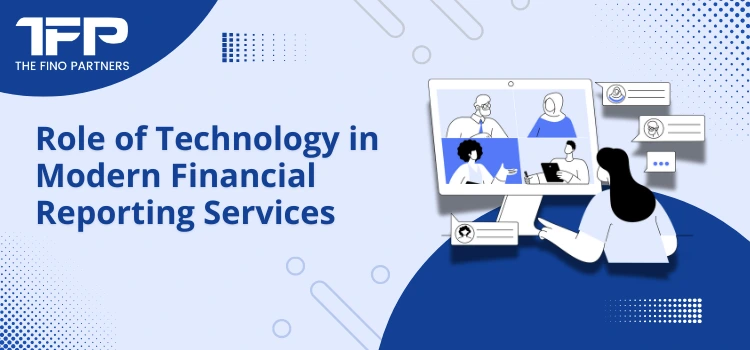Contemporary landscape of financial reporting is completely transformed by the evolution of technology. Technology has elevated the game of financial reporting to a different level. Offering real-time insights, complying with intricate regulations and ensuring credible reporting is possible due to advanced tech. Cloud computing and automation, artificial intelligence (AI) and machine learning (ML) have been the blessings of tech. The techi-fied version of financial reporting has enhanced accuracy, efficiency, and accessibility. This blog explores the many ways how modern tech has revolutionised financial reporting. And how your business can achieve operational and regulatory needs with help of this.
1. The clear case of Automation nad increased efficiency
Benefit:
Automation is one of the greatest developments in financial reporting. Businesses may significantly decrease human error and time spent on tiresome procedures by automating routine duties like data entry, financial reunification, and report preparation. This frees up accounting firms and financial specialists to concentrate on more complex work, such as analysing data and strategy planning.
Resolution:
- Automated Data Processing: Banks, payroll systems, expense reports, and other sources are a few of the sources where financial data is frequently collected. This data is automatically gathered, categorised, and analysed by sophisticated software systems, ensuring that it is ready for reporting.
- Quicker Reporting Cycles: Financial insights were put off in the past since traditional reporting frequently took weeks or months to conclude. Automation decreases the reporting cycle, making it feasible for businesses to provide accurate financial reports significantly more quickly, which enables quicker decision-making.
- Cost Savings: Businesses can mitigate labour costs and avoid pricey penalties by automating these procedures.
2. The fantastic introduction of clod computing and ease of accessibility
Benefit:
Cloud computing has completely transformed how financial data is kept and used by businesses. Financial data is accessible at any time and from any location in a cloud-based environment, providing businesses of all sizes unparalleled versatility and scalability.
Resolution:
- Real-Time Teamwork: Regardless of location, teams can work together in real-time utilising cloud-based financial reporting solutions. This is particularly helpful for businesses with remote workers or offices spread out over several regions.
- Scalability: The complexity of a business's financial data grows with its size. Cloud solutions don't need a large infrastructure investment to scale to meet rising demands.
- Data Security: Top cloud service providers make major expenditures in safety measures to protect confidential financial data from online attacks. Features such as encryption, periodic security upgrades, and multi-factor authentication help safeguard information.
3. AI and Machine Learning for Predictive Analysis
Benefit:
Predictive analytic capabilities are added to financial reporting by artificial intelligence (AI) and machine learning (ML), providing deeper insights that were previously inaccessible. Businesses can plan more efficiently by using AI and ML to forecast future financial trends through analyzing historical data patterns.
Resolution:
- Better Forecasting: AI-driven financial reporting systems have the capacity to evaluate big datasets and generate forecasts that are very precise. This helps businesses to make smarter financial planning and budgeting decisions.
- Anomaly Detection: AI can identify unusual data points or financial transactions, warning businesses about possible issues like fraud, bookkeeping errors, or compliance hazards before they become major issues.
- Customised Reporting: AI and ML algorithms can be programmed to provide reports that are customised to the particular requirements of every business, providing insights that are specifically relevant to their industry or operational model.
4. Accurate financial reporting and the ease of conformity
Benefit:
The financial reporting regulatory climate continues to grow more and more complicated. In addition to local laws, businesses must also abide by international standards such as IFRS (International Financial Reporting Standards) and GAAP (Generally Accepted Accounting Principles). Technology ensures businesses follow these constantly evolving regulations.
Resolution:
- Automated Compliance Checks: Software for financial reporting is created to automatically compare reports to the most recent standards of compliance. This minimizes the likelihood of non-compliance and the fines associated with it.
- Audit Trails: Robust audit trails generated by sophisticated software solutions enable complete accountability and change management for businesses. This is particularly important in conducting internal and external audits, since extensive documentation is required.
- Lower Error Risk: Technology reduces the likelihood of human error in financial services by automating intricate calculations and cross-referencing several datasets. reporting, ensuring a higher degree of accuracy.
5. The accessibility to reporting tools and data visualisation
Benefit:
Particularly for stakeholders lacking financial skills, financial reports can be confusing and hard to understand. This has been rendered easier by technology thanks to data visualisation tools that transform complicated financial data into appealing graphs, charts, and dashboards.
Resolution:
- Interactive Dashboards: A lot of systems for financial reporting come with interactive dashboards that let clients delve further into specific metrics to have a greater understanding of the financial health of the business.
- Real-Time Reporting: By offering real-time insights employing data visualisation tools, businesses can continuously monitor performance rather than waiting for reports quarterly or annually.
- Better Stakeholder Communication: Businesses can more successfully convey financial information to other stakeholders like board members, investors, and staff members through the development of reports which are visually appealing and easy to read.
Conclusion
Contemporary financial reporting services rely largely on technology in today's fast-paced business environment. Automation, artificial intelligence, cloud computing, and data visualization are only a few examples of how technology enhances financial reporting's accuracy, effectiveness, and usefulness. Businesses can use these technologies to meet legal obligations and obtain deeper insights that enhance decision-making as well as to meet regulatory duties. The financial reporting environment is certain to see even more innovative approaches as advances in technology continue making it more effective, transparent, and perceptive. Delegating the responsibility of financial reporting of your business to Fino Partners will let you utilize the modern tech in a budget. Our team will make sure you stay ahead in the race of evolving technology and development.
READ ALSO | Top 10 Benefits of Outsourcing Financial Reporting for Small Businesses




























